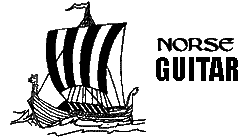Music is the universal language
“Glory to God in the highest heaven, and on earth peace to those on whom his favor rests.” - Luke 2:14
Fretboard Journal
Podcast 517: Jacob Cole
Melbourne, Australia-based guitarist Jacob Cole joins us this week to talk about his 2025 instrumental album ‘Slow Gold’ and so much more. We hear about his Cole’s record-filled childhood, the Melbourne guitar scene, recording in Tasmania (!), and his influences. It’s an insightful chat with an artist we think you’ll love.
https://jacobcole1.bandcamp.com/album/slow-gold
Read the poignant story Jacob’s sister penned for the Guardian here:
https://www.theguardian.com/commentisfree/2025/jul/07/i-spoke-for-my-brother-when-he-was-too-afraid-to-answer-now-he-speaks-in-melodies-and-i-have-learned-to-listen
Our new, 57th issue is now mailing. You can subscribe here to get it.
Our next Fretboard Summit takes place August 20-22, 2026 at the Old Town School of Folk Music in Chicago. https://fretboardsummit.org
We are brought to you by: Stringjoy Strings: https://stringjoy.com
(Use the code FRETBOARD to save 10% off your first order)
Mike & Mike’s Guitar Bar: https://mmguitarbar.com
Peghead Nation: https://www.pegheadnation.com (Get your first month free or $20 off any annual subscription with the promo code FRETBOARD at checkout).
The post Podcast 517: Jacob Cole first appeared on Fretboard Journal.
What’s Inside: Fretboard Journal 57
As we celebrate the 20th anniversary of the Fretboard Journal, our new 57th issue serves as a reminder that great guitar stories are literally everywhere. This time around, we travel to the northern reaches of England, explore the electronics that helped expand Joni Mitchell’s live rig, pay tribute to some fallen guitar heroes, and celebrate the handmade instrument movement.
Here are some highlights found in this issue’s 128 pages.
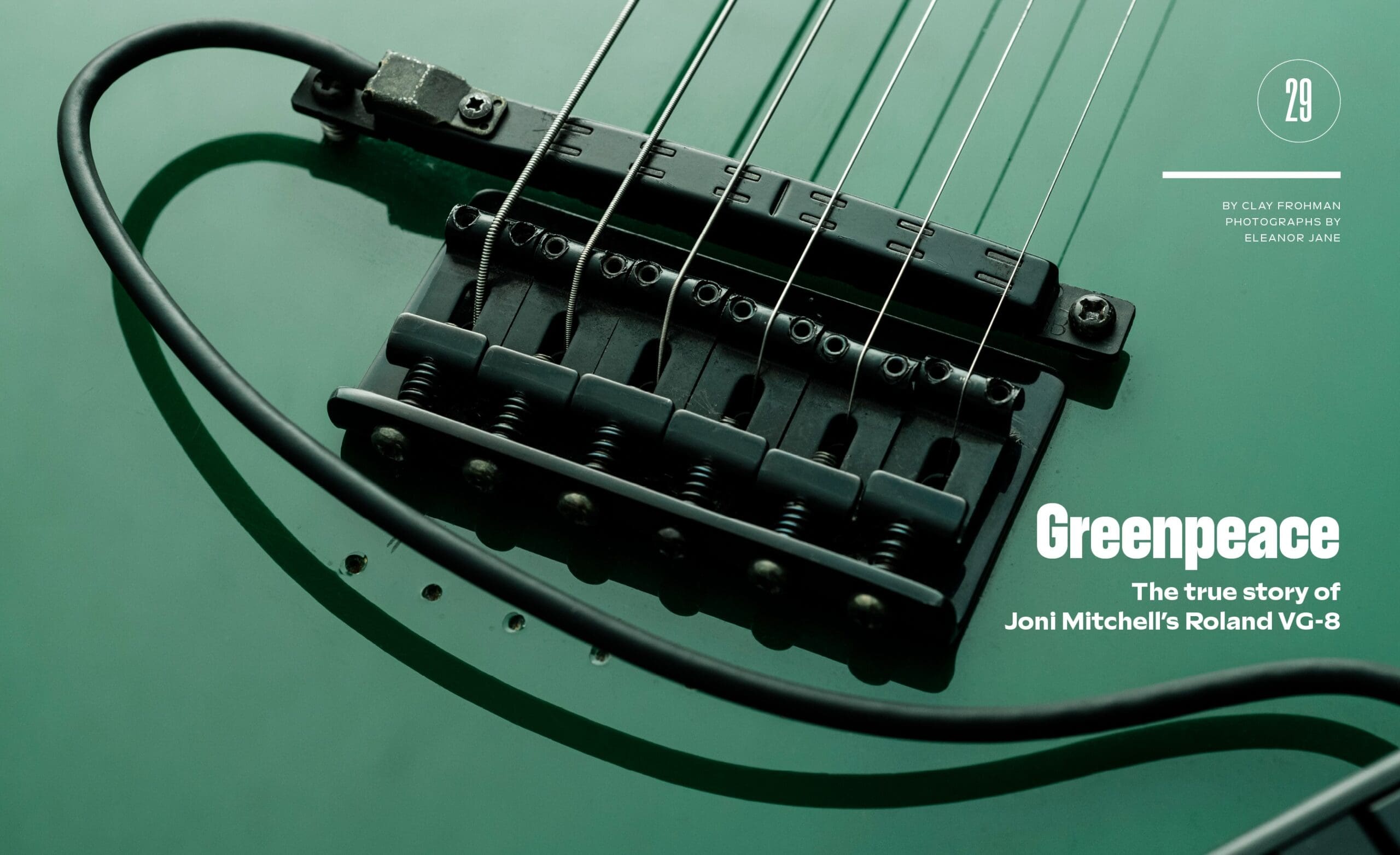
Joni Mitchell has always pushed the boundaries of songcraft and guitar playing. In this issue’s cover story, writer Clay Frohman describes how, in the mid-‘90s, with some help courtesy of Westwood Music’s Fred Walecki, Joni explored the limits of guitar tech and tuning with the help of a Roland VG-8 synth. Acclaimed guitar photographer Eleanor Jane takes pictures of Joni’s actual rig, from the VG-8 to the guitar Walecki built for her.
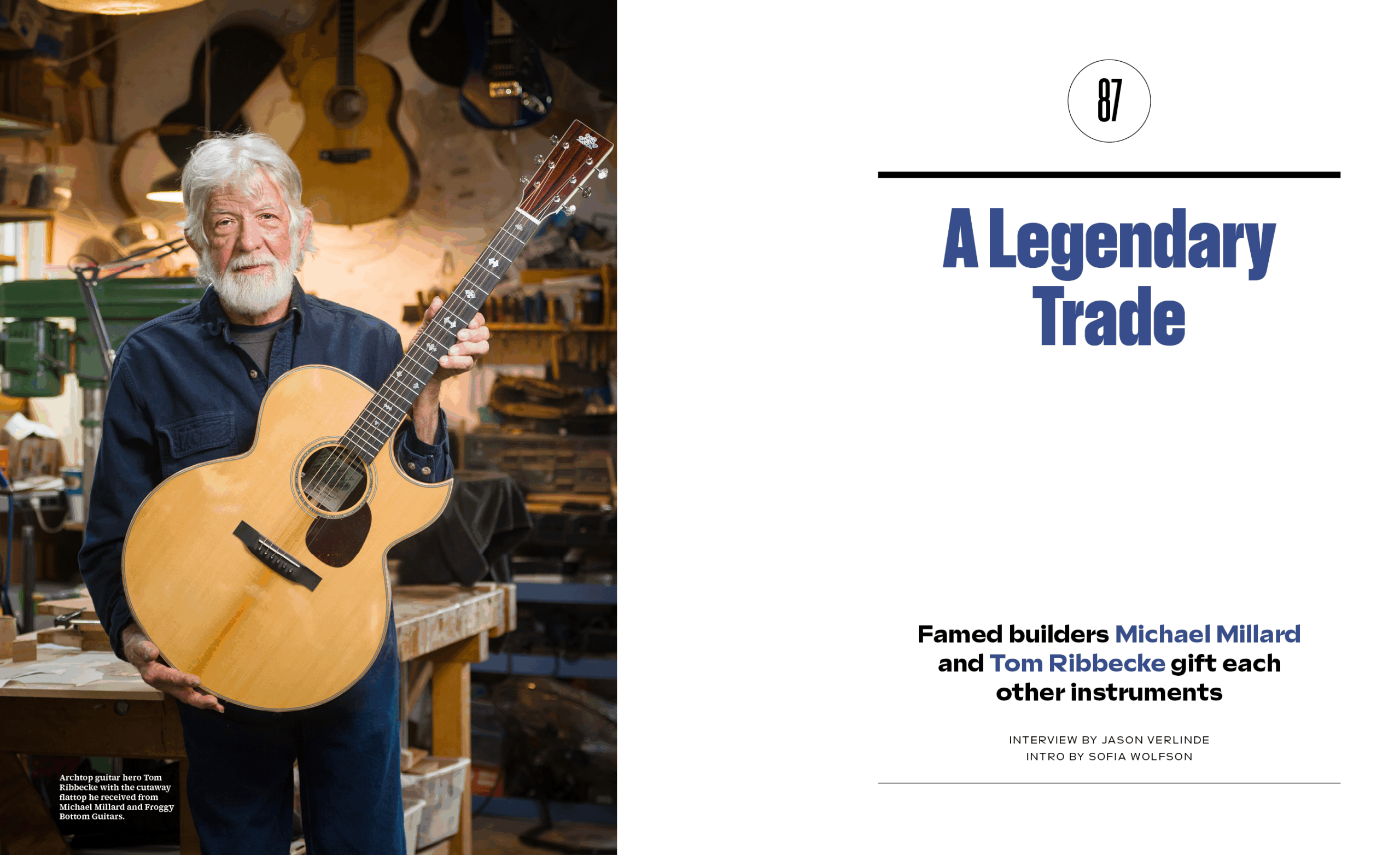
California’s Tom Ribbecke is known for his cutting-edge archtop and bass creations. Vermont’s Michael Millard is a bit more old school; he’s the mastermind behind legendary acoustic flattop company Froggy Bottom Guitars. Fretboard Journal founder Jason Verlinde talks to these decades-old friends about the guitars they just built for each other in the instrument trade of a lifetime.
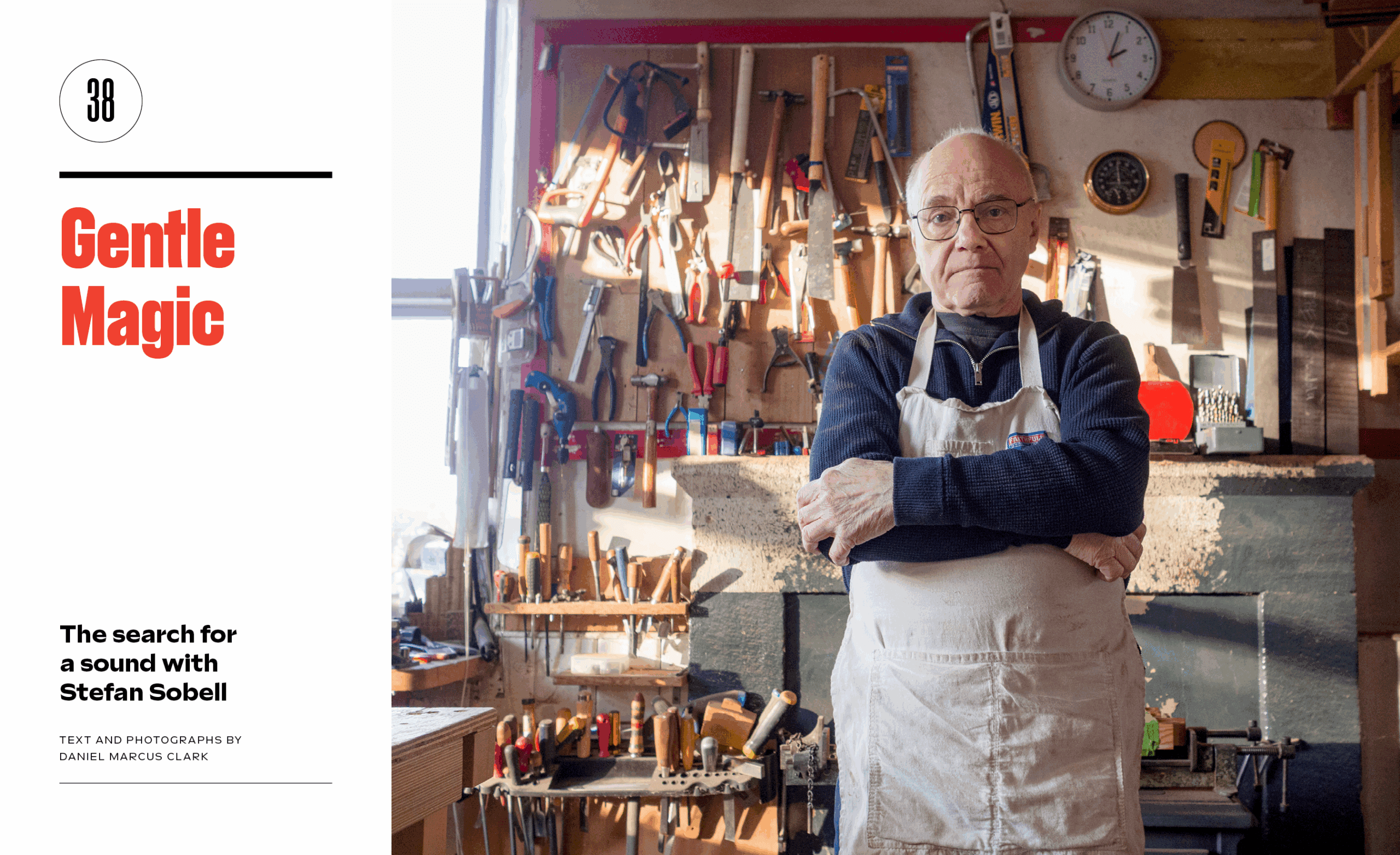
Contributor Daniel Marcus Clark interviews acclaimed UK-based luthier Stefan Sobell about his craft. Sobell is one of those rare stringed artisans who makes nearly everything, including acoustic guitars, citterns, mandolins and bouzoukis.
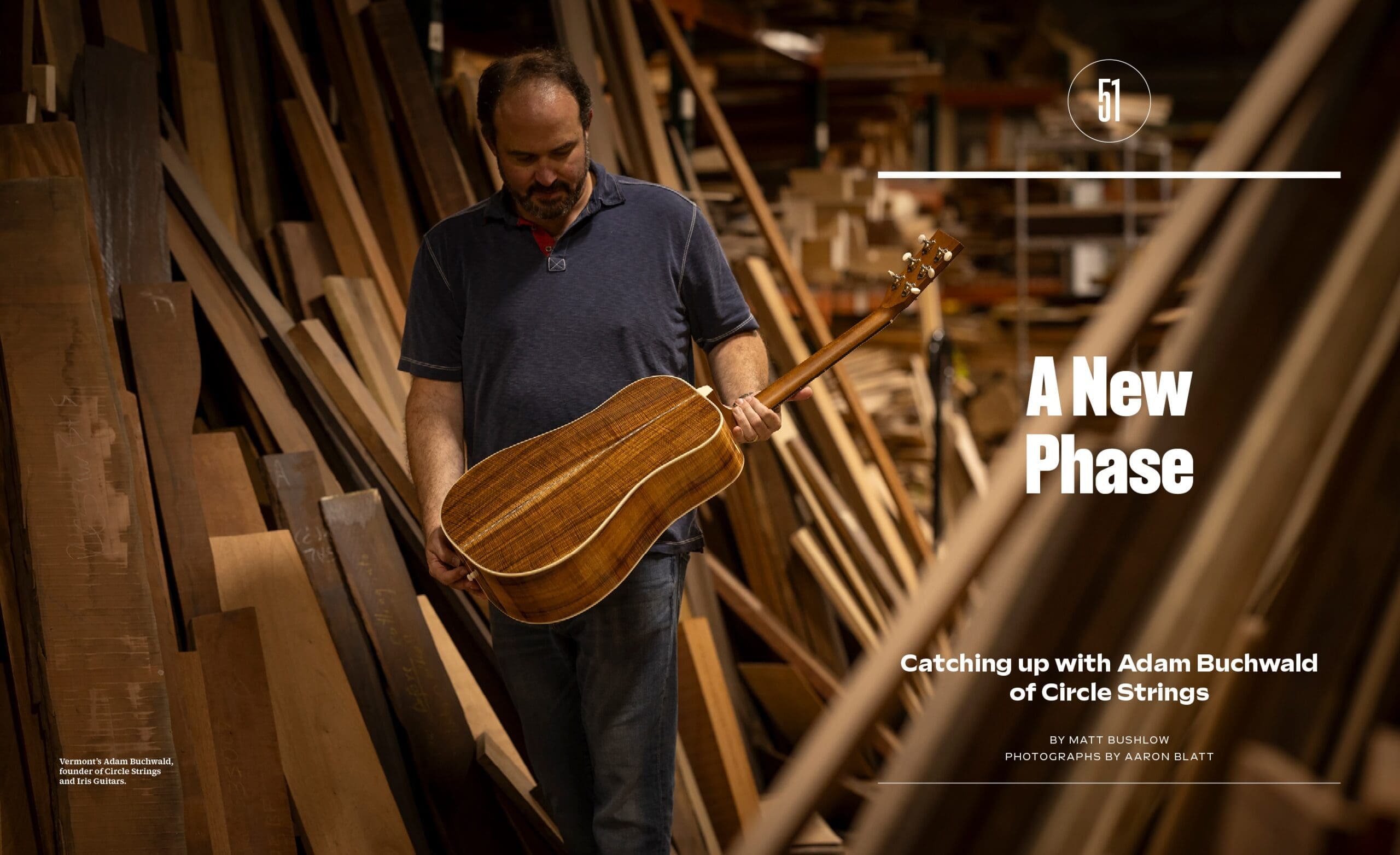
Vermont’s Adam Buchwald has not-so-quietly built one of the fastest-growing guitar companies around. Starting with his high-end Circle Strings imprint, Adam then segued into the budget-minded Iris brand, and is now the current owner of industry suppliers Allied Instruments and Gurian Instruments. Writer Matt Bushlow visits Buchwald and his expansive team at their Burlington headquarters to hear about this mini empire in the fretted instrument space. Photographer Aaron Blatt takes pics of Adam and his team.
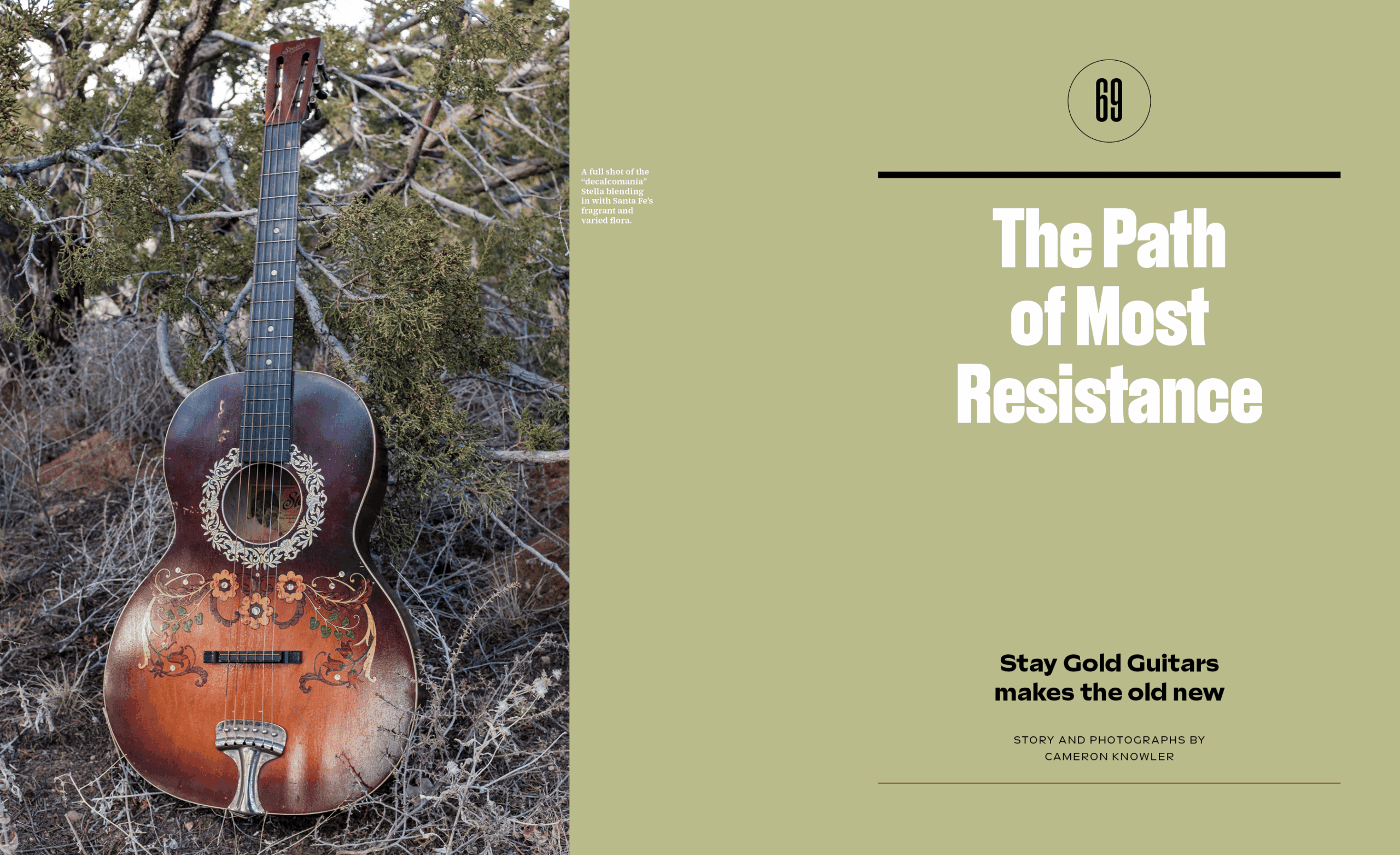
Call it upcycling or maybe hot-rodding. Cameron Knowler interviews Shawn Lee of New Mexico’s Stay Gold Guitars, a store that specializes in taking vintage (but lesser-value) American-made acoustics and rebuilding them for greatness. It’s a place where old Harmony, Bruno and Regal instruments get a second life.
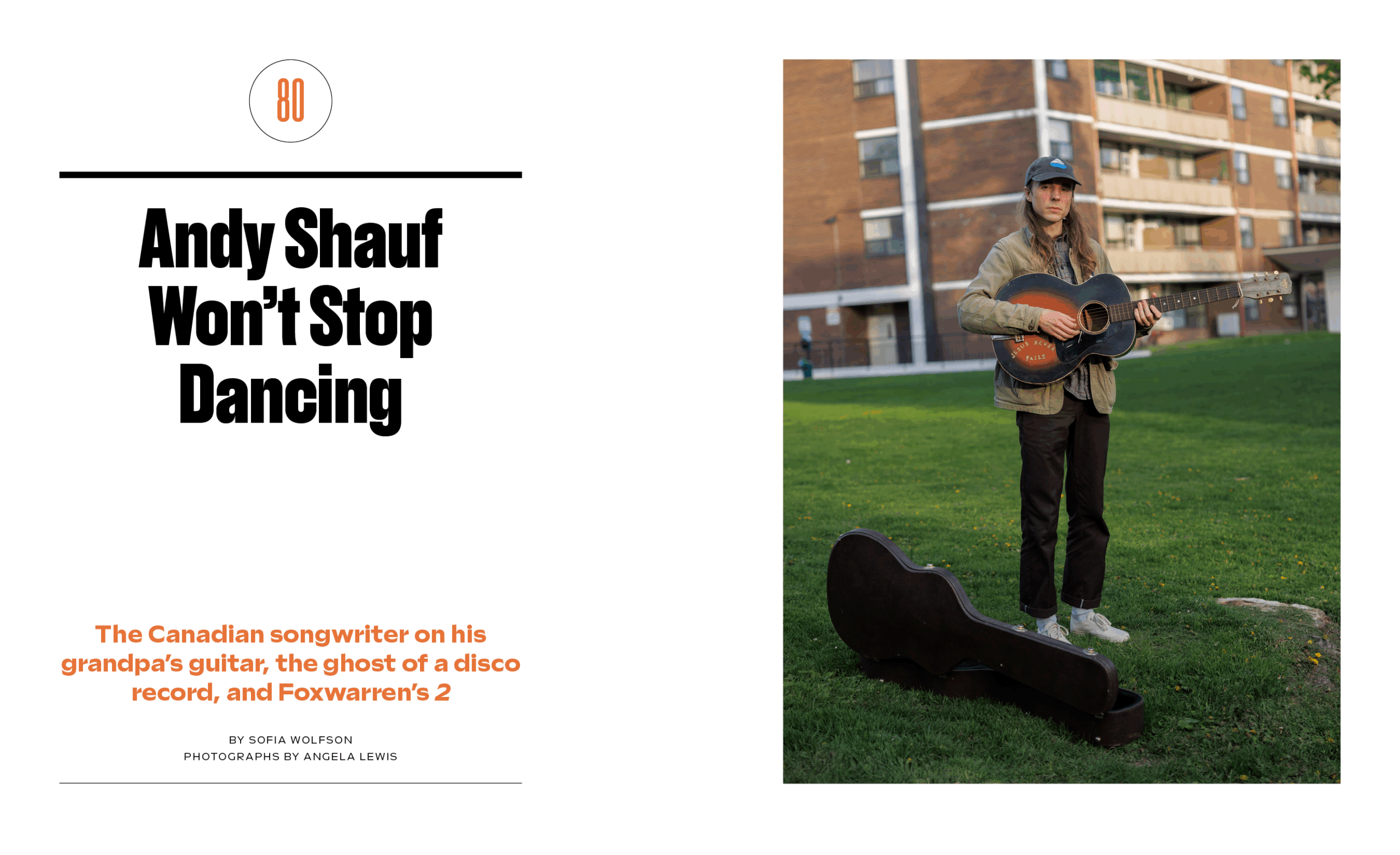
The Fretboard Journal’s Sofia Wolfson interviews singer-songwriter Andy Shauf, a Canadian-born musician with a knack for beautifully orchestrated pop songs. Shauf talks about his creative process and 2, the new album from his band Foxwarren.
Plus Maine folk artist Gordon Bok, vintage Martins, painted cases, and tons of surprises.
Thanks to our community of subscribers, contributors, and sponsors for helping make this issue a reality.
Want this issue? Subscribe today and we’ll send it to you.
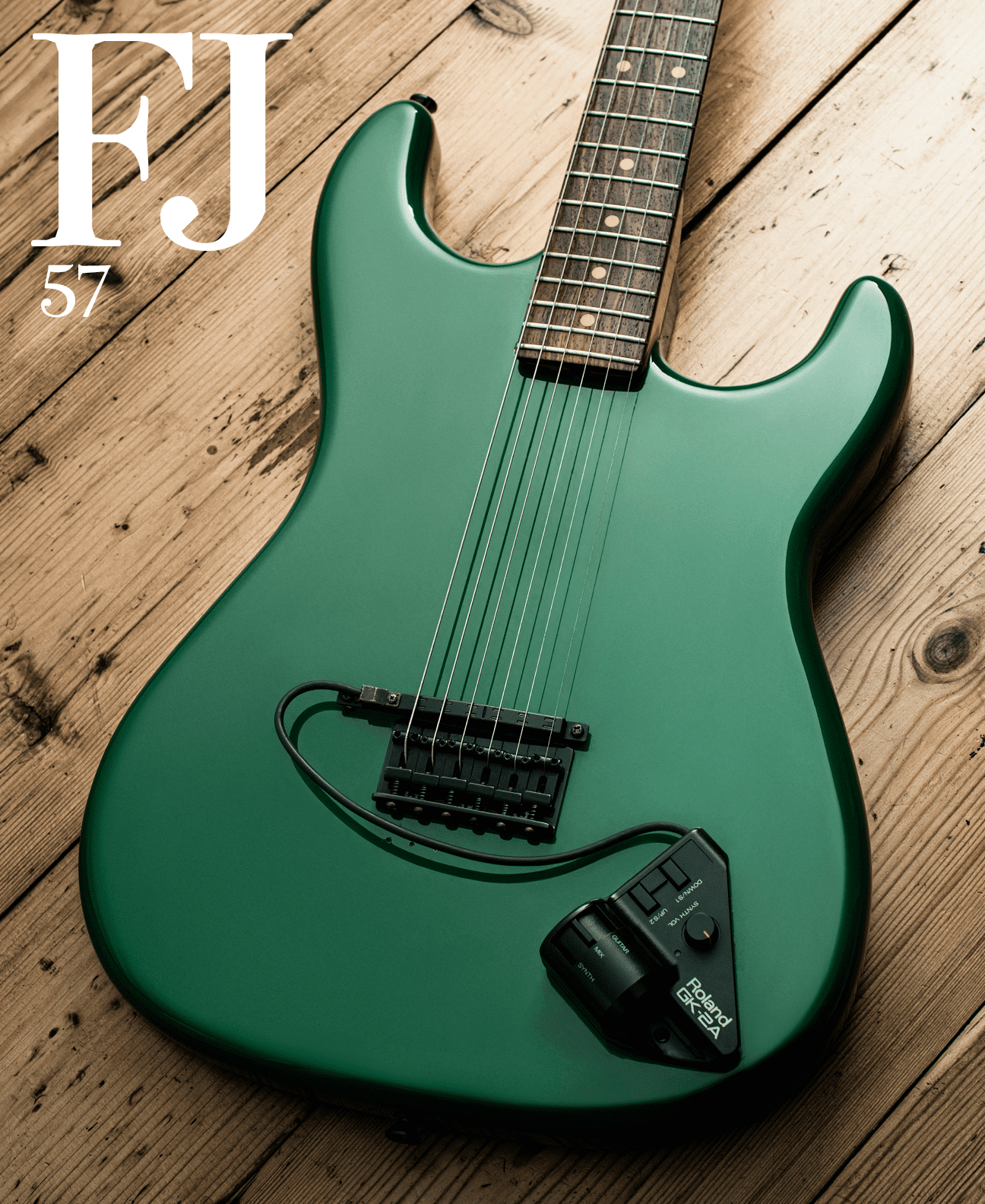
The post What’s Inside: Fretboard Journal 57 first appeared on Fretboard Journal.
Podcast 516: Isaac Stalling
On this week’s episode of the Fretboard Journal Podcast, we introduce you to Brooklyn-based guitarist Isaac Stalling.
Isaac sits down with editor Sofia Wolfson to talk about his musical roots in Oklahoma City, moving to NYC, playing in dozens of bands at once, and his solo project.
https://www.instagram.com/i_stalling_/?hl=en
Our new, 57th issue is now mailing. Subscribe here to get it.
Our next Fretboard Summit takes place August 20-22, 2026 at the Old Town School of Folk Music in Chicago. https://fretboardsummit.org
We are brought to you by: Stringjoy Strings: https://stringjoy.com
(Use the code FRETBOARD to save 10% off your first order)
Mike & Mike’s Guitar Bar: https://mmguitarbar.com
Peghead Nation: https://www.pegheadnation.com (Get your first month free or $20 off any annual subscription with the promo code FRETBOARD at checkout).
Above photo: Nicole Barley
The post Podcast 516: Isaac Stalling first appeared on Fretboard Journal.
The Truth About Vintage Amps, Ep. 153
It’s the 153rd episode of the Truth About Vintage Amps and Skip is having a happy day fielding your amp questions. From cleaning tweed to Magnatone varistors and all points in between, it’s 90 minutes of tube amp knowledge, laughs, and some serious California trivia.
Some of the topics discussed this week:
1:27: The 2025 Fretboard Summit; the importance of repair tags
6:55: Thanks for the mangos, John! And a food preservation tip
8:30: Our sponsors: Grez Guitars; Emerald City Guitars and Amplified Parts!
14:15 What’s on Skip’s bench? 60 amps in August; great Loma Rica deals; far out tubes
23:29 The big TV tubes in Standel amps (6DQ6 tubes, regulator tubes)
25:49 Skip’s near-death experience; The Edwin Hawkins Singers’ “O Happy Day” (YouTube)
31:05 Colman’s Hot Mustard
31:49 A giant yard sale in Dixon
34:23 More TAVA t-shirts; whatever happened to Jason’s Honda Scrambler?
38:04 An antique radio museum in Marysville, California
41:38 Calculating output transformer primary impedance
47:37 Cleaning tweed
49:58 Replacing the varistors in Magnatone/Americana amps; luthier Ken Bebensee; North San Juan, California; the Malakoff Diggins
56:53 Going to Guitar Center, a Gibson GA-20…or was it? Sierra Nevada Brewing Oktoberfest beer
1:01:20 The Rustic Kegger community on Facebook: https://www.facebook.com/groups/tavapodcast
1:02:51 El Pato in Alaska
1:03:41 Fender Tone Ring cabinets
1:05:54 A brown 1962 Fender Super with an 8516 transformer from a TV-front Super
1:11:01 Building a shell for a Falcon chassis
1:12:55 Building a Deluxe 5E3 clone in Brazil
1:20:17 Verellen’s solid-state Octal tube (link); how power attenuators work; Benson’s Monarch Plus power scaling
1:24:41 Recommended music: Texas Alexander & Lonnie Johnson’s “Crossroads” (YouTube); KZFR; Julian Lage; Bill Frisell
1:26:19 Noel Boggs and his Day Sleepers’ “Steelin Home” (YouTube)
1:27:16 Recommended reading: The RCA RC-30 tube manual (Amplified Parts link); California’s two Sebastopols
Need amp tech Skip Simmons’ advice on your DIY guitar amp projects? Want to share your top secret family recipe? Need relationship advice? Join us by sending your voice memo or written questions to podcast@fretboardjournal.com! Include a photo, too.
Hosted by amp tech Skip Simmons and co-hosted/produced by Jason Verlinde of the Fretboard Journal.
Don’t forget, we have a Patreon page. Support the show, get behind-the-scenes updates and get to the front of the line with your questions.
Above: Listener Rafael’s 5F2A-ish build in Brazil. Below: Jay’s El Pato sighting in Alaska.
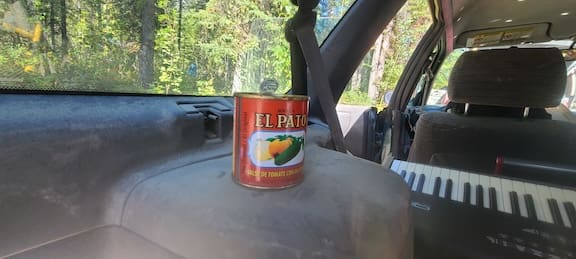
The post The Truth About Vintage Amps, Ep. 153 first appeared on Fretboard Journal.
Life on the Fretboard: Martin Simpson
Martin Simpson is a true icon of the global acoustic music scene. As a guitarist, he has done a huge amount to push the boundaries of the acoustic steel string instrument – showing it can be an expressive and lyrical voice. As a songwriter, he is a masterful storyteller whose poignant lyrics are shared with a disarmingly gentle, no-frills delivery that makes those of us who grew up in the North of England very glad to have done so, and everyone who didn’t wish that they had.
Throughout his career, Martin Simpson has been a vocal proponent of luthier-made guitars – from his early adoption of the work of Northumberland’s Stefan Sobell and Cumbria’s Fylde Guitars to his championing of the next generation of British lutherie with instruments by Taran Guitars in Scotland and Turnstone Guitars in England.
It is no exaggeration to say that Martin Simpson’s musicality and expectations from a guitar have informed the voice of the modern steel-string guitar, perhaps more than any other player. This is very cool indeed.
During my visit to Martin’s home, I had the good fortune to record him playing slide on his Taran guitar. You can watch that video here https://youtu.be/eFJK1zvmPc0, as well as exploring my own instrument by Casimi guitars: https://youtu.be/45WnYusgR4w.
This episode of Life on the Fretboard is brought to you with the kind sponsorship of the author John Stubbings, whose new novel ‘The Guitar Detective’ is a beautiful companion piece to his debut ouvre ‘The Devil Is In It.’ You can get your copy of ‘The Guitar Detective’ right here: https://orpharionpress.com.
You can learn more about Martin Simpson here:
https://martinsimpsonmusic.com
https://www.youtube.com/@MartinSimpsonOfficial
https://www.instagram.com/martinsimpsonmusic
To support Life On The Fretboard please click here https://michaelwattsguitar.com/tip-jars/4745
Michael Watts:
YouTube
https://www.youtube.com/user/michaelwattsguitar
Instagram
https://www.instagram.com/michael.watts.guitar/
Website
https://michaelwattsguitar.com
https://www.fretboardjournal.com
The post Life on the Fretboard: Martin Simpson first appeared on Fretboard Journal.
Podcast 515: Ryan Richter, Dylan Day, and Harrison Whitford (Live from the 2025 Fretboard Summit)
Ryan Richter, Dylan Day, and Harrison Whitford are three wildly creative guitarists who happen to play with some of the most-streamed artists of the last few years, including Ed Sheeran (Dylan), Phoebe Bridgers (Harrison), and Lizzy McAlpine (Ryan). They are all based in Los Angeles.
At the 2025 Fretboard Summit, we sit down with these three musicians to discuss their journeys as artists and collaborators. We hear about why they all landed in LA, how they work with big-name artists, the gear they are currently obsessing over, their solo recordings, and so much more. It’s an introspective chat filled with insights.
https://www.instagram.com/dylnday/
https://www.instagram.com/misterrichter/
https://www.instagram.com/scarrisonwhitford/
Our next Fretboard Summit takes place August 20-22, 2026 at the Old Town School of Folk Music in Chicago. https://fretboardsummit.org
We are brought to you by: Stringjoy Strings: https://stringjoy.com
(Use the code FRETBOARD to save 10% off your first order)
Mike & Mike’s Guitar Bar: https://mmguitarbar.com
Peghead Nation: https://www.pegheadnation.com (Get your first month free or $20 off any annual subscription with the promo code FRETBOARD at checkout).
Subscribe to our reader-supported print magazine: https://www.fretboardjournal.com
Above: Jason Verlinde interviewing Harrison Whitford, Dylan Day and Ryan Richter at the 2025 Fretboard Summit. Photo: Sofia Wolfson
The post Podcast 515: Ryan Richter, Dylan Day, and Harrison Whitford (Live from the 2025 Fretboard Summit) first appeared on Fretboard Journal.
The Truth About Vintage Amps, Ep. 152
Support our sponsors: Amplified Parts; Grez Guitars; Better Help, and Emerald City Guitars!
It’s the 152nd episode of the Truth About Vintage Amps!
Thanks, as always, for being a part of the world’s finest call-in tube amp repair show.
Want amp tech Skip Simmons’ advice on your DIY guitar amp projects? Join us by sending your voice memo or written questions to podcast@fretboardjournal.com! Include a photo, too.
Some of the topics discussed this week:
3:53 Real musicians ARE gearheads (redux)
6:40 Tom Gunterman gets two Grez’s
8:21 Yellow Jacket tube converters
10:27 Standel amps (redux); Todd Clinesmith; National Dobro amps; driver transformers and pre-war amps
17:35 Using an A/B/C switcher box to flip the phase on amp channels
21:45 Thanks to Chicago’s own @vintagetubeamplifiers for stocking the TAVA room at the Fretboard Summit
23:28 Building a clone AB763 with more headroom, ultralinear transformers
29:20 Yellow Jacket YJRs; eggs in ramen
Note: This was supposed to come out in mid-August (pre-Fretboard Summit), but your overextended co-host messed it up. Sorry. We’ll get back on schedule. -Jason
Above: Listener Kendell’s AB763 Twin clone
Want amp tech Skip Simmons’ advice on your DIY guitar amp projects? Want to share your top secret family recipe? Need relationship advice? Join us by sending your voice memo or written questions to podcast@fretboardjournal.com! Include a photo, too.
Hosted by amp tech Skip Simmons and co-hosted/produced by Jason Verlinde of the Fretboard Journal.
Don’t forget, we have a Patreon page. Support the show, get behind-the-scenes updates and get to the front of the line with your questions.
The post The Truth About Vintage Amps, Ep. 152 first appeared on Fretboard Journal.
Podcast 514: Guitar Retail in 2025 (Fretboard Summit Panel)
Do guitars still sell in 2025? Is there a glut of unsold instruments? How have tariffs affected the high-end musical instrument space?
At this year’s Fretboard Summit, we asked a handful of guitar retailers for their unfiltered thoughts on selling instruments in 2025. Included were Rebecca Jasso (Old Town School of Folk Music retail store), Joe Caruso (The Music Emporium), Matt Kappenman (Mass Street Music) and Nathan Schiller (Folkway Music).
Their thoughts on guitar retail may just surprise you, and their insights into how to take care of a customer (and stay profitable during these tumultuous times) were revelatory.
Recorded live at the 2025 Fretboard Summit. We’ll be sharing more talks and panels from the Summit soon. Our next Summit takes place August 20-22, 2026 at the Old Town School of Folk Music in Chicago.
We are brought to you by: Stringjoy Strings: https://stringjoy.com
(Use the code FRETBOARD to save 10% off your first order)
Mike & Mike’s Guitar Bar: https://mmguitarbar.com
Peghead Nation: https://www.pegheadnation.com (Get your first month free or $20 off any annual subscription with the promo code FRETBOARD at checkout).
The post Podcast 514: Guitar Retail in 2025 (Fretboard Summit Panel) first appeared on Fretboard Journal.
Luthier on Luthier: TJ Thompson
For episode 105 of the Luthier on Luthier podcast, my guest is TJ Thompson — widely regarded as the foremost authority on vintage Martins and a master guitar maker in his own right. In our conversation, TJ reflects on why he builds guitars, why he sometimes feels unsuited to the work, and he shares thoughtful advice for fellow luthiers along the way.
Luthier on Luthier is hosted by Michael Bashkin of Bashkin Guitars and brought to you by the Fretboard Journal. This episode is sponsored by Dream Guitars and StewMac.
Want to support Luthier on Luthier? Join our Patreon to get access to exclusive photos and content from Michael and his builds.
The post Luthier on Luthier: TJ Thompson first appeared on Fretboard Journal.
Podcast 513: Jayne Henderson on the Asheville Guitar Project
One last Fretboard Summit 2025 announcement: Jayne Henderson (EJ Henderson Guitars and Ukuleles) stops by the Fretboard Journal to tell us about the Asheville Guitar Project group build that she’ll be unveiling at our annual guitar gathering.
This group guitar build – combining the talents of Asheville-based luthiers Jayne, Kyle Landers, and Judson Riviere – features domestic blowdown woods from Hurricane Helene.
We talk about the region and its recovery from the storm, the unique tone woods used for this guitar, what it’s like to build a guitar with other makers, and so much more!
Come see Jayne at the Fretboard Summit taking place this week: https://fretboardsummit.org/
We are brought to you by: Stringjoy Strings: https://stringjoy.com
(Use the code FRETBOARD to save 10% off your first order)
Mike & Mike’s Guitar Bar: https://mmguitarbar.com
Peghead Nation: https://www.pegheadnation.com (Get your first month free or $20 off any annual subscription with the promo code FRETBOARD at checkout).
Pic: Jayne showing off her entry in our Luthier’s Tool Box book.
The post Podcast 513: Jayne Henderson on the Asheville Guitar Project first appeared on Fretboard Journal.
Podcast 512: 3Bender’s Wade Black
3Bender’s Wade Back joins us this week to share the fascinating history of 3Bender and reveal an incredible new product he’s unveiling at this year’s Fretboard Summit, the Steelmaster.
The Steelmaster is a string bender that can be mounted to any Jazzmaster-style guitar. It requires no drilling and works with stock or Mastery bridges.
Wade’s story is one of a kind. We hear about his love for steel guitar and B-Benders, meeting elderly guitar tech Bob Stafford, and about the Steelmaster’s origin story (which involves Black Bobbin’s Shelby Pollard and last year’s Summit).
Come see Wade and the Steelmaster at the Fretboard Summit taking place this week: https://fretboardsummit.org/
Showcase-only tickets are just $40.
The Fretboard Summit is our three-day festival celebrating great guitars and great guitar people. We have nearly 80 luthiers, amp builders, and pedal makers exhibiting, hourly workshops and master classes, and some mind-bogglingly great evening performances. The fun takes place August 21-23, 2025 at Chicago’s Old Town School of Folk Music.
The Fretboard Summit is our three-day festival celebrating great guitars and great guitar people. We have nearly 80 luthiers, amp builders, and pedal makers exhibiting, hourly workshops and master classes, and some mind-bogglingly great evening performances.
The fun takes place August 21-23, 2025 at Chicago’s Old Town School of Folk Music.
We are brought to you by: Stringjoy Strings: https://stringjoy.com
(Use the code FRETBOARD to save 10% off your first order)
Mike & Mike’s Guitar Bar: https://mmguitarbar.com
Peghead Nation: https://www.pegheadnation.com (Get your first month free or $20 off any annual subscription with the promo code FRETBOARD at checkout).
The post Podcast 512: 3Bender’s Wade Black first appeared on Fretboard Journal.
Podcast 511: Northfield Instruments’ Adrian Bagale
“Here’s what happens when you invite a mandolin company, with crazy curiosity, to a guitar show four years in a row.” -Adrian Bagale
Northfield’s Adrian Bagale joins us this week for what has to be one of the most insightful industry chats we’ve had in years.
We talk about what the company is unveiling at our 2025 Fretboard Summit in two weeks – a new instrument for guitarists, pictured above – but we also talk about so much more.
For nearly 20 years, Northfield has built superb instruments both in the US and China. We discuss Northfield’s unique business model, how they are navigating recent tariffs, and the growing popularity of acoustic music in China itself. Whether or not you play mandolin, Bagale’s enthusiasm for music – and gear – is truly infectious.
https://www.northfieldinstruments.com
Come see Northfield and the new instruments at the Fretboard Summit: https://fretboardsummit.org/
The Fretboard Summit is our three-day festival celebrating great guitars and great guitar people. We have nearly 80 luthiers, amp builders, and pedal makers exhibiting, hourly workshops and master classes, and some mind-bogglingly great evening performances.
The fun takes place August 21-23, 2025 at Chicago’s Old Town School of Folk Music.
We are brought to you by: Stringjoy Strings: https://stringjoy.com
(Use the code FRETBOARD to save 10% off your first order)
Mike & Mike’s Guitar Bar: https://mmguitarbar.com
Peghead Nation: https://www.pegheadnation.com (Get your first month free or $20 off any annual subscription with the promo code FRETBOARD at checkout).
The post Podcast 511: Northfield Instruments’ Adrian Bagale first appeared on Fretboard Journal.
Tribute: Sacred Steel’s Calvin Cooke
On May 24, 2025, the steel guitar community lost the legendary Calvin Cooke. Calvin was a husband, father, and grandfather, a man of deep faith, and a musician who made a profound impact on the sacred steel movement.
Calvin was born in Cleveland, Ohio, in 1944. His uncles were ministers in the House of God Church, founded in 1903 by Mary Magdalena Lewis Tate, known as Mother Tate. Musicians such as Willie Eason, Henry Nelson, and Lorenzo Harrison had introduced the lap steel guitar (at that time a very popular instrument in the United States) into House of God churches starting in the early 1930s, and it caught on. Many of the church’s early congregations were made up of migrant workers, and the steel guitar was an affordable and portable option for bringing music into the revival meetings. It could be used as a melodic instrument or to back up a singer, and early steel players developed a rhythmic technique known as framing, which proved an effective replacement for washboards and other percussion instruments. This was the spiritual and musical environment in which Calvin was born.
As a child, Calvin wanted to be a lead guitarist but found his hands were too small, so he put the guitar on his lap and played it slide-style with a knife. Eventually, he came into possession of a black and chrome Bakelite Rickenbacker and became the steel player in a band with his cousins. Bishop Mary Francis Keith, (head of the Keith Dominion at that time) took Calvin under her wing and, during his school vacations, she began to take him and his band with her as she traveled to different churches around the US, primarily in the Southeast.
One night, Calvin had a dream, which he considered a vision from God, of a new tuning for the 8-string steel guitar. He told Bishop Mary Francis Keith he wanted to pursue his vision, and, according to Grace Cooke, Calvin’s wife, the Bishop said, “Tonight, try it out, and if it goes over well, you know it came from God…and it’s yours.”
This bluesy, funky tuning (E D B G# E B E E) would become Calvin’s signature sound and would result in the Bishop anointing Calvin’s hands as instruments of faith. As Grace explains, “Her blessing influenced the church at large to embrace the sound…the older generation was more used to the slow, country western, mellow kind of sound, and Calvin brought speed and more of a funky, bluesy twist to the gospel way of playing the steel guitar. That’s what made him stand out. That’s what made him unique.”

Chuck Campbell, now an elder statesman of sacred steel who grew up on Calvin’s tuning, explains that the order of the top three strings allowed Calvin to play pentatonic licks with a clarity and speed that no one in the church had ever heard before, “and he was doing this stuff back in the 1960s.”
After high school, Calvin moved to Detroit and worked for Chrysler, but was constantly touring and playing at church services on weekends. During this time, he also acquired an MSA 10-string pedal steel (found by his mother in a pawnshop), which he set up with the help of Chuck Campbell.
As with his 8-string tuning, Calvin created a unique tuning and pedal setup that allowed him to continue to develop his style. Calvin’s ten-string setup is an expanded version of his 8-string tuning, but with the addition of foot pedals, which would allow him to turn the open string E chords into an A or E7 chord. But he didn’t stop there. “Calvin was such an innovator,” Chuck recollects, “he actually started using the pedals for doing lead licks like a whammy bar, that was pretty exciting and that was way back in 1975.”
As he toured, his influence over younger players became more and more evident. “He was a little guy, but he had a large imprint,” says Del Grace, founder of Sacred Strings, the sacred steel museum in Toledo, Ohio. “He wasn’t just a musician, he was a movement. He was a trendsetter…he set the pace for a lot of aspiring musicians of his day and beyond.” This influence would start to transcend the church in the mid-90s, when folklorist Bob Stone and the Arhoolie label produced several CDs and a documentary film featuring Calvin and other sacred steel players such as Ted Beard, Aubrey Ghent, and the Campbell Brothers.
As Calvin was retiring from Chrysler after almost 30 years, he found himself with the opportunity to take his music to a new audience outside the church. Historically, this was frowned upon by the church, since the origins of the style date back to the Jim Crow era, because “the less that was outside of the control of the church, the better chance we have of holding on to it, and not getting it taken from us,” according to Del Grace. But Calvin, who had always been interested in music outside the church (his favorite band was Yes) took the plunge, hitting the folk festival circuit with his band of Jay Caver, rhythm guitar and arranger, Ivan Shaw on drums, and Grace Cooke on background vocals, who reflects: “Calvin always pushed it to the limit. He always told people: Don’t just listen to gospel, it will open up your horizons.” Sacred steel performers like Calvin would become regular features on festival stages in the USA and Europe, “bridging sacred and secular…from church services to international stages,” in the words of Del Grace.
Thanks to Calvin’s boldness and willingness to take his music into a wider world, sacred steel surged in popularity. Groups such as the Campbell Brothers and the Lee Boys started touring nationally and internationally and Robert Randolph, who grew up in the church and considers Calvin one of his mentors, has become a global star. Robert produced two CDs of Calvin’s music in the early 2000s, Heaven and The Slide Brothers. Right up until his passing, Calvin was a part of the Experience Hendrix tour, where he shared the stage with legends like Steve Vai, Eric Johnson, Ernie Isley, Kingfish Ingram, and Buddy Guy. Chuck Campbell, also a part of the tour, remembers these incredible musicians coming up to him and Calvin and saying, “I can’t believe how you guys play that thing! But Calvin was such a courageous player, he never let us be intimidated.”
As the years went by, Calvin retained his primacy in the sacred steel movement. “You can hear his influence in everybody’s playing,” says Kashiah Hunter, an Atlanta-based steel guitarist who performed with Calvin regularly in recent years. “You can hear a lot of the young guys implementing–or trying to implement–his sound.”
Calvin’s influence is most obvious in the repertoire of licks and phrases which his singular tuning (adopted by many steel players since) allowed him to do. Calvin could rake a pristine arpeggio at speed across the high strings and create precisely intonated pentatonic licks. He could effortlessly spin out single-string runs that sounded uncannily like a human voice. When singing, he used his guitar to respond to his vocals with crisp, rhythmically impeccable phrases. But his influence can be discerned in subtler ways as well. “He always played between and inside the melody,” says Chuck Campbell, “the rest of us were pushers, he was just serenading the crowd.” Chuck also notes that Calvin’s vibrato was unique: “He always made sure that I learned to play without vibrato, and to bring in the vibrato at the end of the note to give it that vocal sound.” He was a genius at building a solo break, as Kashiah observes: “He would start off real soft and subtle to make everyone pay attention to what he was doing, then he gently brought it back up…he worked it, he just completely worked the crowd. It amazed me every time.”
Even though many elements of Calvin’s style have become standard vocabulary for sacred steel players, he had a style that was uniquely his own. For example, he frequently employed a lower drone note when playing high single-string licks, adding a timbral quality reminiscent of fingerstyle blues guitar or Appalachian fiddle. This pedal tone lent his playing a more “guitaristic” sound than the melismatic style favored by players like Aubrey Ghent, though Calvin could make the guitar weep and wail with the best of them. Calvin also loved a major seventh and exploited its delicate emotional quality to great effect, another striking choice in a genre heavily imbued with pentatonic runs and blues-inspired bends. He didn’t rely on attention-grabbing fireworks to build intensity during his solo breaks; subtle changes in pitch, articulation, and phrasing were enough to communicate to the rest of the band that it was time to turn up the heat.
In recognition of his remarkable musical abilities and his contribution to the church over the years, Calvin was awarded with the Sacred Steel Legends Award in 2009. He was also a member of the first class of inductees to the Sacred Steel Hall of Fame a year later. He was the recipient of the Michigan Heritage Award in 2011. In 2024, he was able to attend the grand opening of the sacred steel museum, of which he had been a major supporter. Calvin, teary-eyed, toured the exhibits with his children and grandchildren. “When I see this museum,” Del Grace remembers him saying, “this is my thank you for the hard work.”

Calvin’s work may be over, but his legacy continues to live on in ways both large and small. “He added an element of personality to his position of being one of the greatest steel players…it was a thing which brought unity to all of us. That was on full display at his funeral. Where we would normally be rivals, we were family.” And at the time of his death, Calvin was mentoring his wife Grace’s nephew, who at six years old was deeply inspired by Calvin’s playing and already showing signs of promise. As Calvin put it, “He’s got a good hand.”
There are a number of musicians who could play the same notes as Calvin, but very few who had an impact that transcended generations and boundaries. Calvin always attributed this to his faith in a higher power. When he played music, he said, “I want them to feel what He gives us through our music. No matter if it’s secular or gospel music, I want them to know that I didn’t get this on my own, I was blessed to learn how to play this, and we’ll try to give them something they’ll never forget and play from our heart….I want you to feel what I’m doing, and if He touches me to do it, I want him to take it from these strings and make that SOUND penetrate from here to the heart to the rest of the body and make them say…I never felt nothing like this before.”
Thank you for your music, Calvin. You will be greatly missed.
Sources:
Interview with Calvin Cooke, conducted by Bob Stone, various dates
Interview with Calvin Cooke and Kashiah Hunter, conducted by Natalie Jordan, 7/7/2023
Interview with Grace Cooke, conducted by Raphael McGregor, 6/20/2025
Interview with Del Grace, conducted by Raphael McGregor, 6/21/2025
Interview with Chuck Campbell, conducted by Raphael McGregor, 6/24/2025
The post Tribute: Sacred Steel’s Calvin Cooke first appeared on Fretboard Journal.
Podcast 510: Dave Hill
Dave Hill is a comedian, actor, author, musician and podcaster. He’s also a guitar fanatic. In fact, at the 2025 Fretboard Summit, he’ll be performing an entire stand-up set on guitar (!) and doing some crowd work on your pedal boards.
On this week’s podcast, we talk to Dave about his love for guitar, why teenage gear obsessions are so hard to kick, his plans for his Summit set and how he balances so many different facets to his career. It’s a great chat with a brilliant and funny artist.
https://www.davehillonline.com
Register for the Summit here: https://fretboardsummit.org/
The Fretboard Summit is our three-day festival celebrating great guitars and great guitar people. We have nearly 80 luthiers, amp builders, and pedal makers exhibiting, hourly workshops and master classes, and some mind-bogglingly great evening performances.
The fun takes place August 21-23, 2025 at Chicago’s Old Town School of Folk Music.
Our Podcast Sponsors
Stringjoy Strings: https://stringjoy.com
(Use the code FRETBOARD to save 10% off your first order)
Mike & Mike’s Guitar Bar: https://mmguitarbar.com
Peghead Nation: https://www.pegheadnation.com (Get your first month free or $20 off any annual subscription with the promo code FRETBOARD at checkout).
The post Podcast 510: Dave Hill first appeared on Fretboard Journal.
Podcast 509: James Kee of East Nash Grass
James Kee of East Nash Grass joins us this week to talk about his band’s forthcoming album ‘All God’s Children’ and the guitar he just acquired and restored, a 1955 Martin D-18 formerly owned by Earl Scruggs!
During our chat, we learn all about the D-18’s restoration (which Nashville luthier Hugh Hansen just completed), East Nash Grass’ forthcoming record ‘All God’s Children,’ why you should always have an Intellitouch tuner on-hand, and so much more.
https://www.instagram.com/jamesalankee/?hl=en
Band photo: Scott Simontacchi
D-18 restoration pics below courtesy of Hugh Hansen:
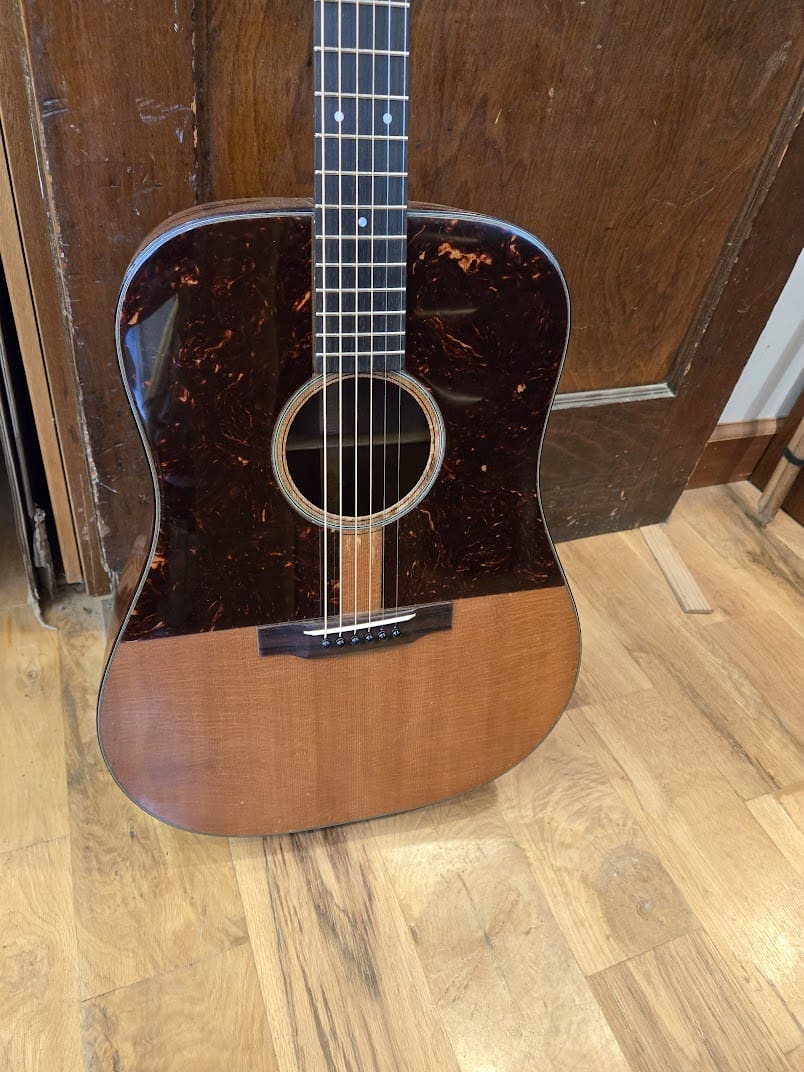
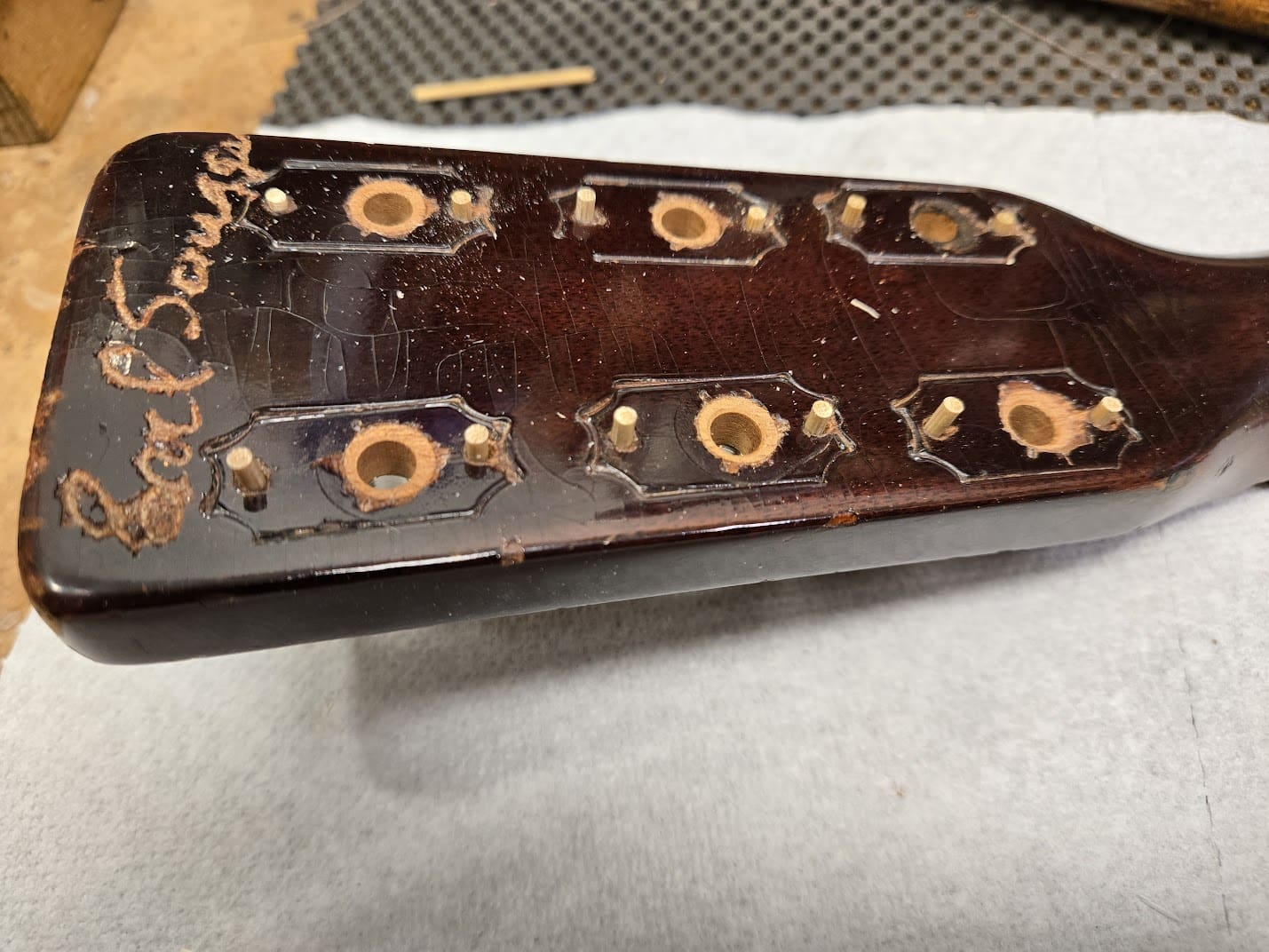
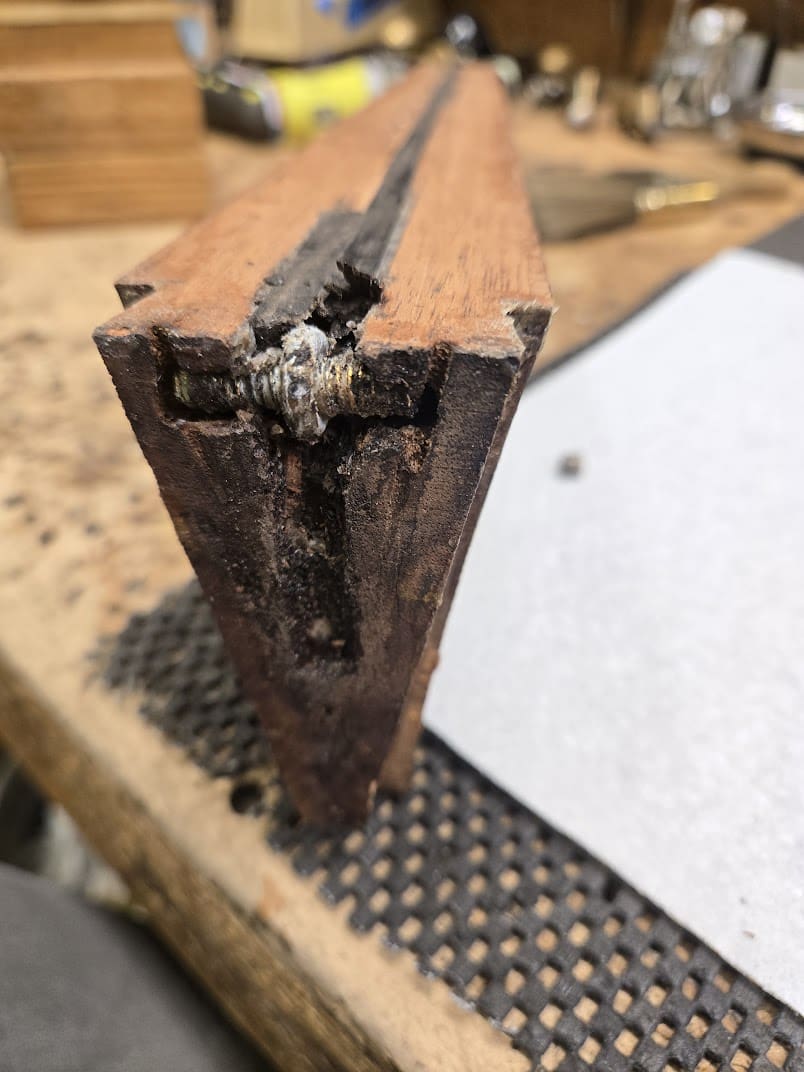
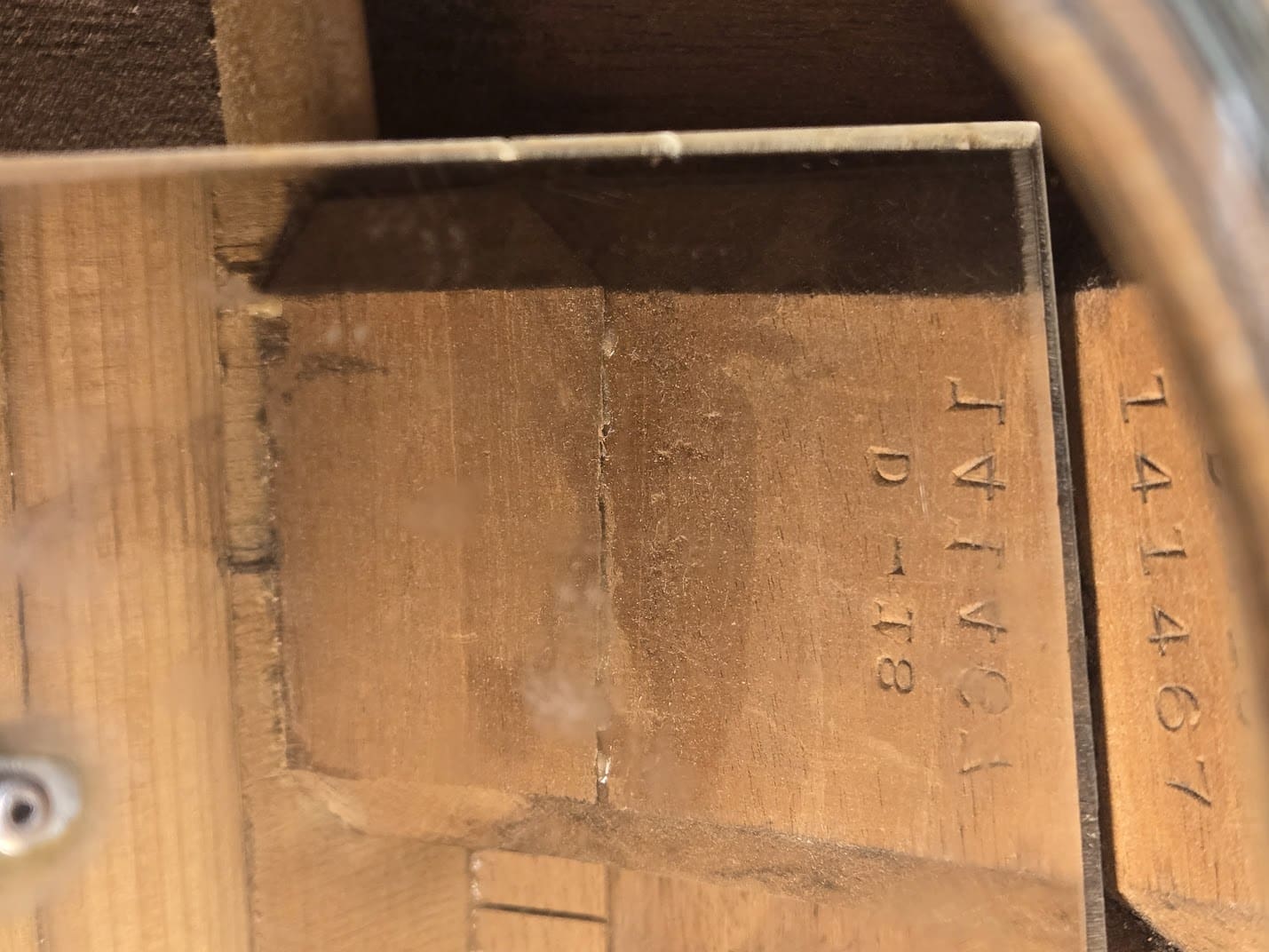
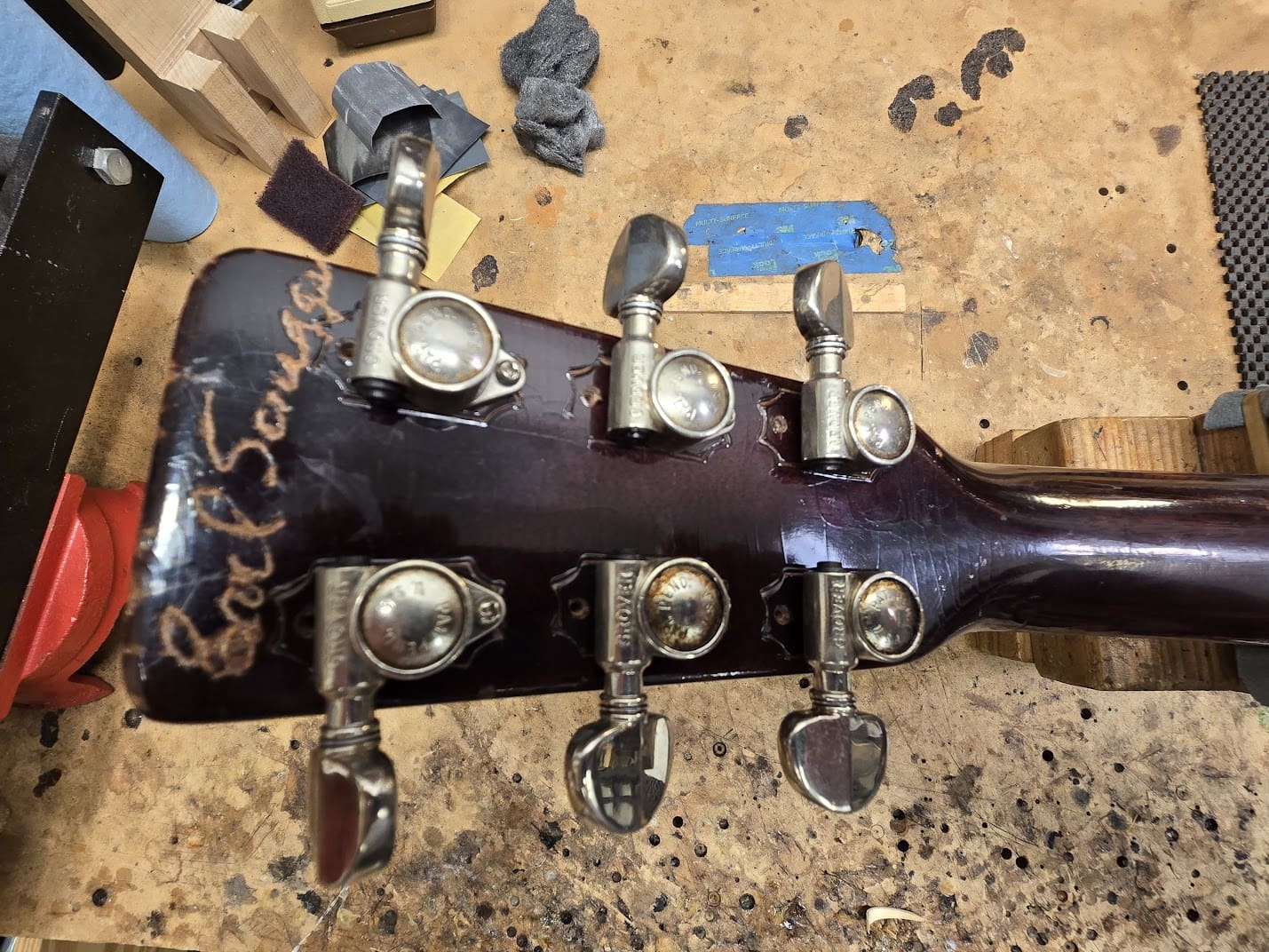
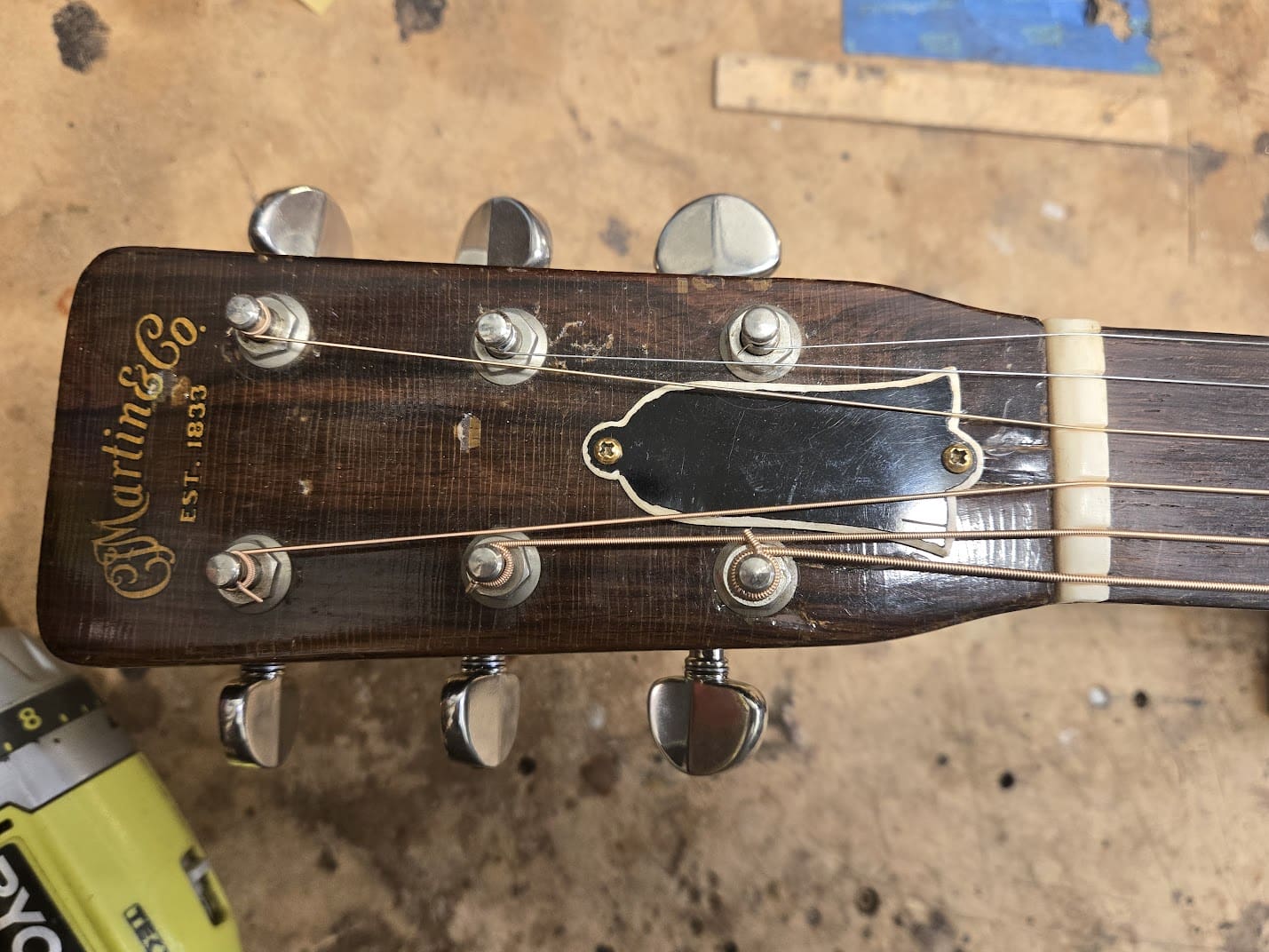
We are brought to you by:
Stringjoy Strings: https://stringjoy.com
(Use the code FRETBOARD to save 10% off your first order)
Mike & Mike’s Guitar Bar: https://mmguitarbar.com
Peghead Nation: https://www.pegheadnation.com (Get your first month free or $20 off any annual subscription with the promo code FRETBOARD at checkout).
The post Podcast 509: James Kee of East Nash Grass first appeared on Fretboard Journal.
Luthier on Luthier: Michael Sankey
On Episode 104 of the podcast, I talk with Michael Sankey, a wildly creative guitar maker from Ottawa. Michael’s work combines old-school methods like hand tools and hide glue with futuristic elements like 3D-printed metal parts.
We get into how he balances tradition with innovation—and why he builds guitars based on his own ideas, not just what the market expects.
https://www.sankeyguitars.com/
Luthier on Luthier is hosted by Michael Bashkin of Bashkin Guitars and brought to you by the Fretboard Journal. This episode is sponsored by Dream Guitars and StewMac.
Want to support Luthier on Luthier? Join our Patreon to get access to exclusive photos and content from Michael and his builds.
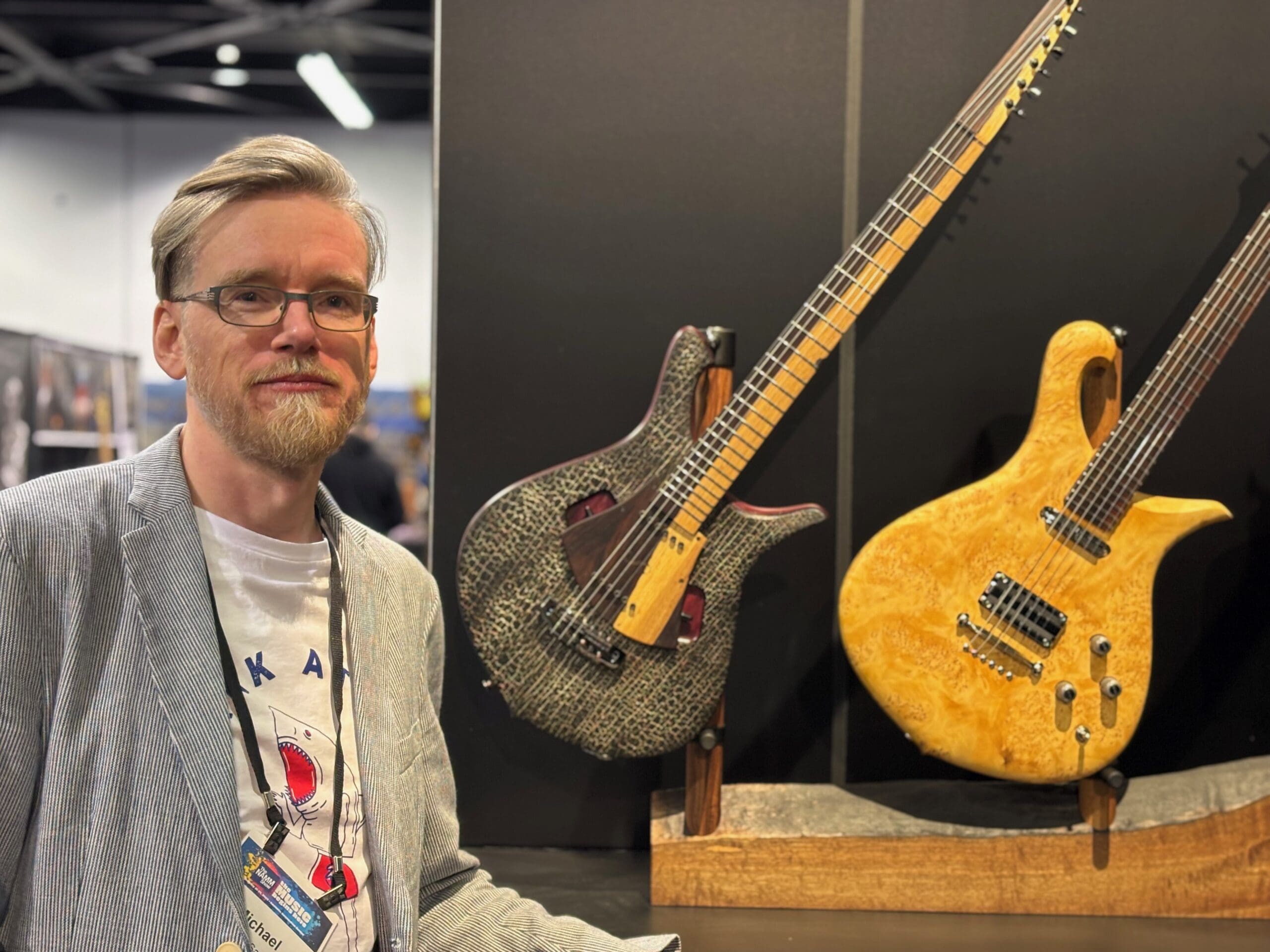
The post Luthier on Luthier: Michael Sankey first appeared on Fretboard Journal.
The Truth About Vintage Amps, Ep. 151
Support our sponsors: Amplified Parts; Grez Guitars; Better Help, and Emerald City Guitars!
It’s the 151st episode of the Truth About Vintage Amps!
Thanks, as always, for being a part of the world’s finest call-in tube amp repair show.
Want amp tech Skip Simmons’ advice on your DIY guitar amp projects? Join us by sending your voice memo or written questions to podcast@fretboardjournal.com! Include a photo, too.
Some of the topics discussed this week:
1:03:05 What’s on Skip’s bench: A pile of Standel amps; Vacaville’s Pacific Hardware (redux); a baffler of sorts
8:28 Tom Gunterman (Instagram); Kevin from Ohio; Joe Walsh
11:30 Our sponsors: Grez Guitars; Emerald City Guitars and Amplified Parts! Marshall Capris; Christopher Guest
19:07 Julian Lage and Leo Kottke (tour dates here)
22:45 The Fretboard Summit August 21-23, 2025 in Chicago: https://fretboardsummit.org
23:57 What to do with the unused bass control on a modded Vibrochamp?
31:38 Weak tremolo on a late 1970s Fender Deluxe Reverb; optocouplers
36:36 The Bastard Instrument (Amazon link); the Ampeg book
44:57 A Teisco Melody amp; Takt amps; installing an isolation transformer
55:49 ESR / Multifunction testers
59:51 Channel jumping on a black panel Fender; Yellow Jacket tube converters (Amplified Parts link, we’ll revisit this on our next episode…sorry)
1:05:30 The Soundmaster 600; Traynor YGM-3; Fender PS-400 and the Allman Brothers
Above: Listener Joel’s Teisco Melody amp
Want amp tech Skip Simmons’ advice on your DIY guitar amp projects? Want to share your top secret family recipe? Need relationship advice? Join us by sending your voice memo or written questions to podcast@fretboardjournal.com! Include a photo, too.
Hosted by amp tech Skip Simmons and co-hosted/produced by Jason Verlinde of the Fretboard Journal.
Don’t forget, we have a Patreon page. Support the show, get behind-the-scenes updates and get to the front of the line with your questions.
The post The Truth About Vintage Amps, Ep. 151 first appeared on Fretboard Journal.
Podcast 508: Summer School Electronics Founder Mark Turley
Summer School Electronics founder Mark Turley joins us this week to discuss the history of his pedal company, his day job as a schoolteacher, our Fretboard Summit gathering, and so much more.
In what has become an annual tradition, Summer School will be debuting a new, wild pedal at our Summit. For the first time ever, Mark will also teach a pedal-making class during our festival. Space is limited, but you’ll go home with the ultimate Summit souvenir…a new pedal that you created!
Register for our Summit:
https://fretboardsummit.org/ (August 21-23, 2025 in Chicago!)
To RSVP for Mark’s pedal build class: https://www.summerschoolelectronics.com/shop/p/fretboard-summit-pedal-building-class
We are brought to you by:
Stringjoy Strings: https://stringjoy.com
(Use the code FRETBOARD to save 10% off your first order)
Mike & Mike’s Guitar Bar: https://mmguitarbar.com
Peghead Nation: https://www.pegheadnation.com (Get your first month free or $20 off any annual subscription with the promo code FRETBOARD at checkout).
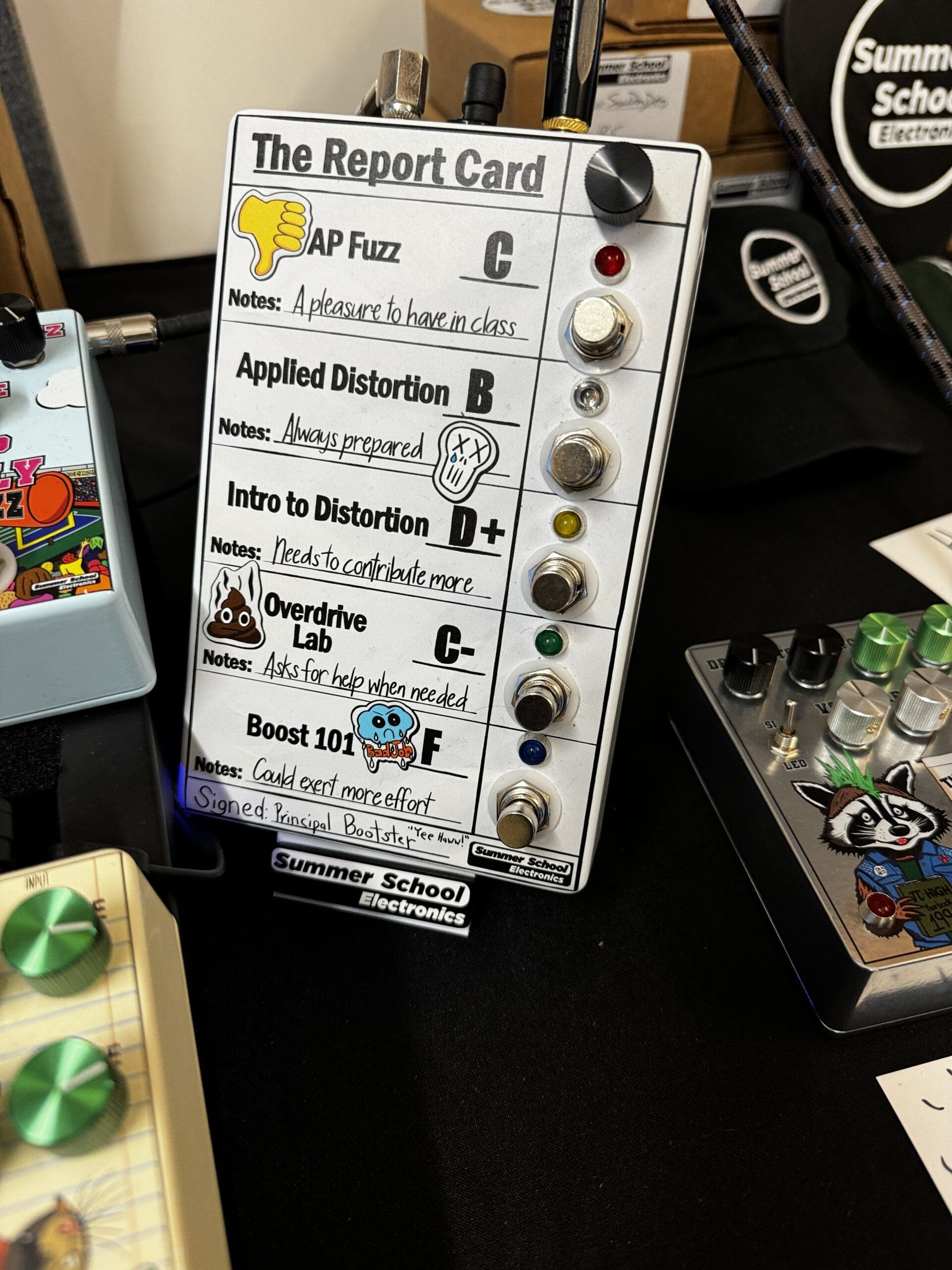
The post Podcast 508: Summer School Electronics Founder Mark Turley first appeared on Fretboard Journal.
A First Timer’s Guide to the Chicago Fretboard Summit 2025
Our annual Fretboard Summit takes place August 21-23, 2025 at Chicago’s Old Town School of Folk Music.
Wondering what the heck the Fretboard Summit is?
You’ve come to the right place. We’ve created this first-timer’s guide to help you wrap your head around the proverbial tailpiece of this special gathering. Our 2025 Summit will be our sixth, and largest, to date.
What is the Fretboard Summit?
It’s a hang, a conference, and a music festival rolled into one.
Basically, it’s our take on the ultimate guitar geek weekend, where you can meet the heroes we celebrate on our pages and podcasts (players and builders); see some ridiculously cool concert lineups; try out (and buy) some insanely unique guitars; learn a bunch; and make some new friends.
It’s also one of the only open-to-the-public conventions that features a who’s-who of legendary guitar and gear makers. And, yes, you can actually meet them all.
Why?
Because we wanted to celebrate the community around the Fretboard Journal. Acoustic and electric. We also wanted you to be able to meet all these great personalities we interview and showcase in our magazine.
You don’t need to be a serious collector, gigging musician, or virtuoso to attend. Just have an open mind and you’ll have a blast.
Who is playing this year?
An eclectic bunch of artists you’ve probably read about in our magazine and a few we can’t wait to turn you on to.
We’re still making announcements and additions to the lineup (a few are secrets we can’t divulge quite yet), but we can tell you that Charlie Hunter and Ella Feingold will be there, performing and teaching. Ella is a funk guitar god who was recently featured on our podcast. It remains one of the most downloaded episodes we’ve ever done. Charlie will be playing a solo blues set honoring Blind Blake. It’ll be amazing. We’ll also hear about their new duo record.
We also know that jazz guitar great Jonathan Stout is coming back, as is FJ favorite Ryan Richter (pictured above). This year, Ryan is bringing Dylan Day and Harrison Whitford – two of LA’s best session guitarists – out to the Summit. We’ll hear from all three. Fretboard Journal Assistant Editor Sofia Wolfson is going to teach a songwriting class. We’ve also got sessions on everything from the Fender history to African guitar.
Last but not least, you will be playing. This is a festival made for musicians of all stripes. Beyond all the included guitar workshops, there are unlimited opportunities to play, jam with friends, or try out new guitar gear. We have soundproof rooms if you want to rock out (or just try guitars in private).
Space is limited because this is about as interactive as festivals get. We want you to get hands-on time with cool gear.
What is the Old Town School of Folk Music?
A Chicago institution. Founded in 1957 the Old Town School of Folk Music provides a wide range of music, dance, theater, and visual arts courses to people of all ages, abilities, and backgrounds. It’s a magical 501(c)(3) not-for-profit with an expansive campus featuring two buildings across the street from one another. We take over both facilities and fill them to the brim with sessions, workshops, jam rooms, and demo spaces.
When you picture Chicago, you may think of Wrigley Field or some busy downtown street or that one Wilco cover with the two buildings. The neighborhood that Old Town is in is easily walkable and there are dozens of nearby cafes, shops and restaurants. It’s like the cool neighborhood in your town, but in Chicago.
Who attends the Summit?
An eclectic mix of guitar fanatics (of all abilities), collectors, luthiers, industry members, and working musicians from around the world. Our crowd tends to be more eclectic and diverse than you’d think – young and old, all genders. But we all connect over a love for guitars.
Having said that: We limit Summit all-access passes to just a few hundred. We want everyone who attends to see the concerts, meet their heroes, and have fun without crowds. So if you want to come, it’s best to register soon before it sells out.
Who will I meet?
That’s up to you!
This year’s Summit has some of the most respected names in guitar craft: You can meet the crews behind Martin, Collings, Santa Cruz, Taylor, Beard, Yamaha, Gallagher, and Chase Bliss. It’s a rare opportunity to talk to lutherie legends like Andy Powers (Taylor Guitars), Richard Hoover (SCGC) and Wayne Henderson.
We have interective exhibits – a
In 2023, Bill Frisell led a guitar orchestra that anyone could join; the year prior the Milk Carton Kids all taught us how to harmonize. We also attract some of the biggest YouTube and podcast influencers around (Rhett Shull will be there, along with Emily from Get Offset and many others).
Best of all, you’ll meet a bunch of great players who probably aren’t currently on your radar…and fellow collectors.
What does a day look like?
Each day has over 12 hours of programming planned. We don’t expect you to catch it all (that would be crazy), but it’s there for you.
Get to Old Town School on Friday morning (August 23) at around 9 or 10 a.m., get your pass, browse the schedule and decide whether you want to browse guitars at the lutherie showcase or attend a workshop. Proceed however you like. The Old Town campus has two buildings and it’s a little daunting at first, but just consider it a giant guitar funhouse. (Someone from the FJ or OTS will be at the front registration desk to help you if you have any questions.)
I encourage pass holders to take their time and not expect to attend everything. Some of the coolest music moments happen in the lobbies or just by sticking around a sponsor booth for a while.
There’s a lunch break every day where attendees and their new friends grab a bite nearby. I like the Indian place about a block away, but there burgers, dumplings, cafes and more within about 300 yards of the venue. You’ll see lots of Summit badges at neighboring restaurants. Don’t hesitate to introduce yourself. In the afternoon, there’s a whole new slate of afternoon sessions.
Concerts tend to start after dinner in the two theaters: The historic Maurer Concert Hall (capacity 420) is where our bigger names play, while across-the-street at Szold Hall you can catch some of the more adventurous programming. Your pass gets you into everything. You can come and go as you please.
What are the workshops like?
Once you find a class or session you’d like to attend, just show up. No reservation is needed with your all-access pass. Some classes are intimate affairs, some have 20-50 people. We put the bigger draw workshops in the big theater, but there’s typically room for everyone. We’ve had live podcast tapings, serious master classes on guitar technique, AMAs with guitar celebrities and more.
If you want to leave a session early, just politely get up and go. There are usually two to three sessions going every hour so you can try something else.
What styles of music are represented?
Rock, bluegrass, roots music, blues, jazz, folk, singer-songwriters, and all points in between. Basically, the pages of the FJ coming to life.
How expensive is it?
We’ve preserved our pricing from last year: Three-day passes are $400.
This includes everything, all-day-long: Admission to all the evening concerts, all the instructional workshops, opportunities to win some truly cool guitars in our raffles, the ability to buy Summit exclusive gear, networking events, a great swag bag, and surprises.
You also get early and unlimited access to the lutherie showcase featuring over 70 guitarmakers.
Even without the rest of the Summit programming, this is arguably the largest handmade and boutique guitar showcase in North America.
Walkable dining options abound near the venue at every price point. You can stay wherever you like (see below).
Where should I stay?
We get asked this a lot.
Honestly, you can stay wherever you like in Chicago. Probably aim for a hotel or Airbnb that fits your price range somewhere north of downtown Chicago and south of downtown Evanston. If the reviews online look good and it fits your price range, go for it. (Checking your cab fare ahead of time using an online calculator is also a good idea.)
All Summit activities take place at Old Town School, from morning to night. So once you’re there each day, there’s no need to go anywhere else. Hotel Zachary near Wrigley is an Old Town staff favorite, but you really can’t go wrong if the Tripadvisor reviews and room rate meet your standards.
If you’re on a guitar forum or have friends into guitars, post about the Summit and see if you can go in on an Airbnb. There are many in the vicinity of Old Town, but they tend to get reserved quickly.
New this year: We’re setting up a What’s App channel for attendees to connect on ride shares, lodging or just horse trade guitars.
What guitar should I bring?
Over half of our attendees don’t even bother bringing a guitar, but we’ve also seen plenty of pre-war dreadnoughts, Taylors, homemade creations, and all points in-between. We’ve seen plenty of new and old electrics, too.
Our Truth About Vintage Amps Podcast Room – filled to the brim with great, rare and obscure vintage amps – always has a few electrics to use, too.
Yes, there is a fully secure guitar check-in room if you want to drop an instrument to run errands or eat.
What brands and builders are attending in 2025?
It’s a long list that includes Martin, Collings, Yamaha, Henriksen, Chase Bliss, D’Addario, Gallagher, Beard, and Taylor. We’ve also got smaller-batch builders like Mike Baranik, 3Bender, Huss & Dalton, Bruce Guitars, Cedar Mountain mandolins, Sam Guidry, Shock the Fox,Grez, Greenfield, Cardinal, R. Robinson, Mule, Paul Woolson, and dozens more. The full lineup of exhibitors is here.
Also, if you’re in the Chicago area and just want to go guitar shopping and not attend any of the panels, concerts, parties or workshops, we’ll offer single-day lutherie showcase passes soon.
How do I sign up?
Register today at www.fretboardsummit.org. And holler if you have any questions.
Still trying to picture this event? Check out these totally unsolicited videos posted by some of our past attendees…
The post A First Timer’s Guide to the Chicago Fretboard Summit 2025 first appeared on Fretboard Journal.
Podcast 507: Skip Heller Returns
Musician, composer, and writer Skip Heller was one of the Fretboard Journal’s earliest subjects, contributors, and podcast guests.
On this week’s show, we catch up with Skip to talk about his new exotica album, ‘Mojave After Dark.’ We chat about his early pieces for the magazine – including the story on John Hartford he penned for our fourth edition – and so much more. Skip has a wealth of knowledge when it comes to music. You may just want to take notes.
https://skiphellersvoodoo5.bandcamp.com/album/mojave-after-dark
We are brought to you by:
Stringjoy Strings: https://stringjoy.com
(Use the code FRETBOARD to save 10% off your first order)
Mike & Mike’s Guitar Bar: https://mmguitarbar.com
Peghead Nation: https://www.pegheadnation.com (Get your first month free or $20 off any annual subscription with the promo code FRETBOARD at checkout).
https://fretboardsummit.org/ (August 21-23, 2025 in Chicago!)
The post Podcast 507: Skip Heller Returns first appeared on Fretboard Journal.
